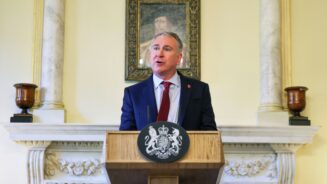Leveraging Biomedical Data to Understand and Fight Disease

First launched in 2006, UK Biobank has grown to be one of the largest and most thorough biomedical databases in the world, encompassing genetic, physical, and health data from 500,000 volunteers. This vast resource for health research, augmented regularly with new data, has enabled groundbreaking discovery globally into disease cause and progression.
WHO WE’RE SUPPORTING
UK Biobank’s vast trove of data is uniquely available to researchers across the world. Currently, over 30,000 researchers from more than 90 countries are registered to use UK Biobank, including 10,000 researchers in the United States alone. With its steady growth in data and with new technologies, UK Biobank is becoming the world’s preeminent biomedical database.
To achieve that goal, UK Biobank is enhancing its older infrastructure with cutting-edge equipment, including a latest-generation robotic freezer that can store and swiftly retrieve—four times faster than at present—the 20 million biological samples that have been donated by UK Biobank’s half-million volunteer participants. At the same time, UK Biobank is accelerating its efforts to digitize tens of thousands of older medical slides associated with tumor biopsies, among other illnesses, readying these samples for Artificial Intelligence (AI).
To make room for these new initiatives, the U.K. government recently announced a £154 million investment into UK Biobank’s physical infrastructure for a purpose-built 131,000-square-foot facility in Manchester Science Park, in the heart of the city’s Oxford Road Corridor Innovation District. Operated with the support of The University of Manchester, this new state-of-the-art facility will accommodate improved biological storage and processing laboratories and will expand access for researchers from around the country and the world.
Griffin Catalyst’s support for UK Biobank will enable essential follow-on research into how participants’ health has changed over the years and how wearable technologies impact health assessments, as well as into biomarkers for early disease detection. These collective donations to UK Biobank will allow cutting-edge AI applications to draw upon these datasets to drive new insights and discoveries into how to treat, or even prevent a wide range of disease.
With philanthropic support from Griffin Catalyst and Schmidt Futures, this public-private consortium complements the U.K. government’s investments in research and development to provide new funding pathways for the world’s most gifted researchers to take greater risks and to pursue new approaches.
WHY IT MATTERS
Far too often, doctors detect many types of serious or fatal diseases—such as pancreatic cancer—too late. By the time patients are experiencing symptoms, there are often no effective interventions.
One emerging solution is the use of biomarkers, whose discovery can enable early diagnosis of life-threatening diseases such as cancer or Alzheimer’s disease—even before patients themselves experience any symptoms. Advances in AI can empower researchers to analyze and interpret UK Biobank’s immense data. In one such breakthrough, in 2018, researchers analyzing genomic data from UK Biobank were able to devise a genetic test to detect people born with an increased risk of coronary heart disease, thus alerting doctors and allowing proactive measures to be carried out before life-threatening situations arise.
As it expands its work into other areas, UK Biobank will also continue its existing pioneering data collection—including the world’s largest imaging study of internal organs, which will open up new ways to investigate mechanisms for diseases as diverse as arthritis, coronary heart disease, osteoporosis, and Alzheimer’s.
WHAT’S THE IMPACT
The expansion and upgrade of UK Biobank—already recognized as a key global scientific resource—will enable it to extend its service to medicine and biology and, through improved biomarkers and other techniques, lay the groundwork for future scientific discoveries that will dramatically improve human health and treatment.
An important benefit of UK Biobank’s efforts relates to the development of new medications; biomarkers allow for shorter, less expensive clinical trials, leading companies to invest additional resources into the discovery of new drugs, and thus bring new treatments to the public more swiftly.
What no one can put a number to is the sheer human impact that the early detection of life-threatening diseases will have for patients everywhere.

